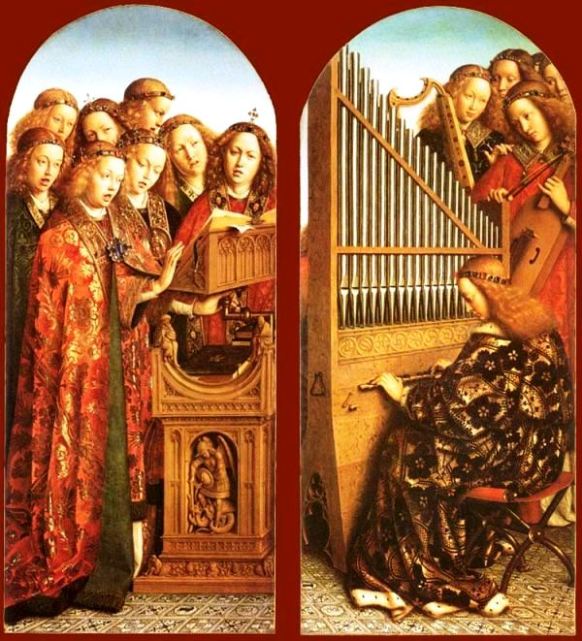Bach’s St Matthew’s Passion
Perhaps the greatest religious work of Christian culture. The St Matthew Passion solemnly re-enacts Christ’s final hours, envisioning the great mysteries of Christ’s suffering and death.
Click for Youtube recording of the ‘Passion’
Pie Jesu
Various versions, the most popular at the moment being by Andrew Lloyd Webber. The words come from verse 19 of the Roman Catholic Prayer for the Dead: ‘Pie Jesu Domine qui tollis peccata mundi, dona eis requiem’, translating as ‘Lord Jesus, all pitying, who takes away the sins of the world, give them eternal rest.’
Click for Youtube recording of ‘Pie Jesu’
Requim Opus 48 VII, ‘In Paradisum’

Fra Angelico,
Angel in ‘The Annunciation’
Gabriel Fauré 1845-1924
The title translates as ‘Into Paradise’, and the solo part does in fact seem to be the voice of an angel calling the person who has died – this is part of the Roman Catholic burial service – into Paradise.
Click here for Youtube recording of ‘In Paradisum’
Te Deum
Gregorian chant, 4th century AD, authorship unknown, but it may have been St Ambrose or Bishop Nicetas of Remesiana.

Da Vinci, Creation of Man,
Sistine Chapel
Te Deum laudamus: te Dominum confitemur.
Te aeternum Patrem omnis terra veneratur.
Tibi omnes Angeli; tibi caeli et universae Potestates;
Tibi Cherubim et Seraphim incessabili voce proclamant:
Sanctus, Sanctus, Sanctus, Dominus Deus Sabaoth.
Pleni sunt caeli et terra maiestatis gloriae tuae.
Te gloriosus Apostolorum chorus, Te Prophetarum laudabilis numerus,
Te Martyrum candidatus laudat exercitus.
Te per orbem terrarum sancta confitetur Ecclesia,
Patrem immensae maiestatis: Venerandum tuum verum et unicum Filium;
Sanctum quoque Paraclitum Spiritum.
Tu Rex gloriae, Christe. Tu Patris sempiternus es Filius.
Tu ad liberandum suscepturus hominem, non horruisti Virginis uterum.
Tu, devicto mortis aculeo, aperuisti credentibus regna caelorum.
Tu ad dexteram Dei sedes, in gloria Patris.
Iudex crederis esse venturus.
Te ergo quaesumus, tuis famulis subveni: quos pretioso sanguine redemisti.
Aeterna fac cum sanctis tuis in gloria numerari.
Salvum fac populum tuum, Domine, et benedic hereditati tuae.
Et rege eos, et extolle illos usque in aeternum.
Per singulos dies benedicimus te; Et laudamus Nomen tuum in saeculum, et in saeculum saeculi.
Dignare, Domine, die isto sine peccato nos custodire.
Miserere nostri domine, miserere nostri.
Fiat misericordia tua, Domine, super nos, quemadmodum speravimus in te.
In te, Domine, speravi: non confundar in aeternum.
Click here for Youtube recording of ‘Te Deum’
Hallelujah Chorus George Frederic Handel
Hallelujah! Hallelujah! Hallelujah!
Hallelujah! Hallelujah!
For the Lord God Omnipotent reigneth.
Hallelujah! Hallelujah! Hallelujah! Hallelujah!
The kingdom of this world
Is become the kingdom of our Lord,
And of His Christ, and of His Christ;
And He shall reign for ever and ever,
For ever and ever, forever and ever,
King of kings, and Lord of lords,
King of kings, and Lord of lords,
And Lord of lords,
And He shall reign,
And He shall reign forever and ever,
King of kings, forever and ever,
And Lord of lords,
Hallelujah! Hallelujah!
And He shall reign forever and ever,
King of kings! and Lord of lords!
And He shall reign forever and ever,
King of kings! and Lord of lords!
Hallelujah! Hallelujah! Hallelujah! Hallelujah!
Hallelujah!
Click here for Youtube recording of the Hallelujah Chorus from Handel’s ‘Messiah’
Jesu, Joy of Man’s Desiring Johann Sebastian Bach

Light of the World, William Holman Hunt
One of Bach’s most simple, enduring songs, its melody is familiar to most people – it has been featured in dozens of films over the years, and is a popular song at weddings.
An English translation of the words:
‘Jesu, joy of man’s desiring,
Holy Wisdom, Love most bright;
Drawn by Thee, our souls, aspiring,
Soar to uncreated light.
Word of God, our flesh that fashion’d,
With the fire of life impassion’d,
Striving still to truth unknown,
Soaring, dying, round Thy throne.
Through the way where hope is guiding,
Hark, what peaceful music rings!
Where the flock, in Thee confiding,
Drink of joy from deathless springs.
Theirs is beauty’s fairest pleasure;
Theirs is wisdom’s holiest treasure.
Thou dost ever lead Thine own
In the love of joys unknown.’
Click here for Youtube recording of Jesu, Joy of Man’s Desiring
Mass No 19 ‘Requiem – Lacrimosa’ Wolfgang Amadeus Mozart
Anyone who ever saw the film ‘Amadeus’ will remember this music as the expression of Mozart’s (and indeed our) unrelenting, unstoppable rush towards Death. Surely one of the most profound pieces of music ever written. It continues to be produced in a variety of forms – for a really different interpretation, listen to the group Evanescence as they perform ‘Lacrymosa’ in their album ‘The Open Door’.
Click here for Youtube recording of Mass No19 ‘Requiem – Lacrimosa’
Ave Maria, Giulio Caccini

Jesus and Veronica on the way to the cross
Am I imagining it, or is there really an overwhelming sense of regret and sadness in this music? Why would this be? Surely the prayer itself is a hymn of praise, not lament? (Hail Mary, full of grace, the Lord is with thee…..) Or is it a comment on the terrible sadness of Mary’s life?
Click here for Youtube recording of Ave Maria, Giulio Caccini
Miserere Mei, Gregorio Allegri
This is a musical setting of Psalm 51, which begins
‘Have mercy on me, O God, according to your steadfast love; according to your abundant mercy blot out my transgressions. For I know my transgressions, and my sin is ever before me….’
‘Basically, the music is quite simple. A five-part choir alternates with a tenor solo to who sings the plainsong. But the real telling effect comes from five solo verses where a single treble voice soars to Top C, above the other solo voices. Here words, music and singers combine to convey sorrow and beg forgiveness.’
Click here for Youtube recording of Miserere Mei, Gregorio Allegri
Mass in B Minor, ‘Sanctus’, Johann Sebastian Bach

Christ the Redeemer,
Rio de Janeiro, Brazil
This piece is considered to be one of the highlights of classical music.
‘If you mention church music to the ordinary music lover, they may think ‘That’s not for me’, but Bach is the great exception to that rule. Even though he was writing for a particular type of liturgy in Protestant Germany, his music leaps over all barriers – it’s shot through with dance music and rhythmical energy and optimism. It takes the music right out of its provincial context and makes it a beacon for all people, the whole of mankind, in the twenty-first century.’
Click here for Youtube recording of the Mass in B Minor, ‘Sanctus’, Bach
Va Pensiero, Chorus of the Hebrew Slaves from ‘Nabucco’, Giuseppe Verdi
 This aria was inspired by Psalm 137:
This aria was inspired by Psalm 137:
‘By the waters of Babylon, there we sat down and there we wept when we remembered Zion.
On the willows there we hung up our harps…..’
Some of the words of ‘Va Pensiero’ (in English) are:
‘Greet the banks of the Jordan
and Zion’s toppled towers…
Oh, my country so lovely and lost!
Oh, remembrance so dear and so fraught with despair!
Golden harp of the prophetic seers,
why dost thou hang mute upon the willow?’
The slaves in Babylon sing of their longing for their homeland, far away but ever present in their hearts.
© Copyright 2006
Elizabeth Fletcher



